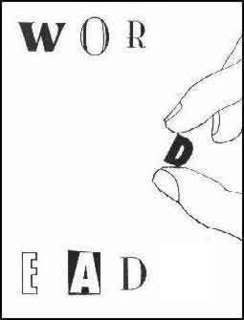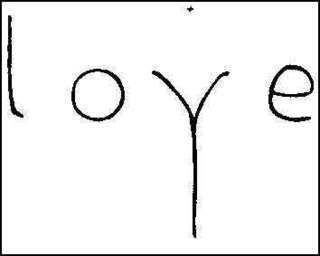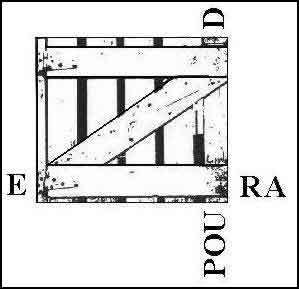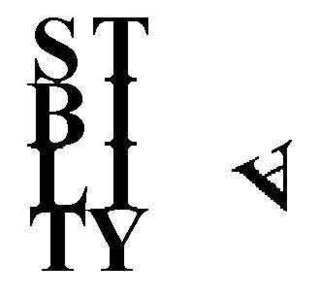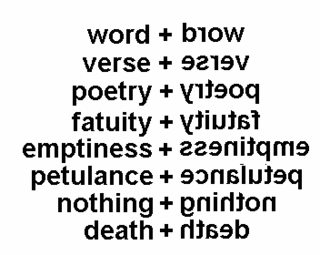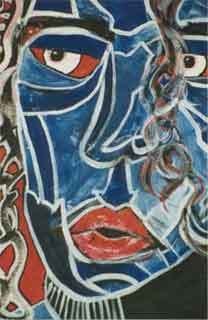eros laughs, lies back
on the bed, her left foot ankle
resting against her
neck vertebrae
how did she do that and
how can she do that and
walk?
this and that and this touch
of sheets, simple friction, cold
but then starts blossoming, long
Sundot pinprick growth
summer at its tips, white
heat a daisy lays
unfolded. an open secret
the honey flees deeper
Tips against tips as when
the tow driver checks the battery for a charge
knocking the jump cable terminals together, blue spurt
flash between the tapping
I in another for a while, not caring
or minding
freedom from mind
unthinkable
so what was it? I dunno
rawer, sunnier, hotter, touched but
other from - antelope quite wild,
as yet unnamed gestures
lope, lope, lope
ripping gulping
broken throat water fountain
high arching silvery lawn sprinklers
some
twists into mist, never comes down
Why saturday is better than sunday"to have peace in a life of pain" - Eckhart
To sit here, in the morning
and hear a few birds outside.
To sip coffee, to hear
the low horn of the train.
My old friend Nietzsche
arises from his rented bed in Turin,
he glances at his face in the bathroom mirror.
Not too much headache this morning.
In Strasbourg, Germany, Eckhart
passes sparrows hopping in a dry spot
under an awning. In his mind,
he thinks of the word "endurance,"
crosses it out, replaces it with
"acceptance."
Amichai looks out across Jerusalem.
He sees two dresses hanging on a clothesline,
in his mind, replaces one of the dresses
with a man's shirt, brightens the color
of the other dress, changes "hanging" to "flapping
in a breeze," and continues to chew
on his toothpick.
And let us not end this poem
without a mention of Ryokan
sitting in his thatch hut in the woods,
yawning, cold - the hearth fire's
out.
*
meeting years later It was a long time since they had last met.
Both of their faces were a little bit broader.
The sun ruffled red feathers on a blunt-beaked
cardinal.
While she made tea in the kitchen
with a sound of clinking and steam,
he walked through the apartment, stopping to bend
down and appreciate a small jade maple,
two tiny porcelain cats.
A sound of wind chimes somewhere.
He noticed a book that looked familiar
nestled between Freud and Schopenhauer.
He opened it, saw pages he had dogeared
years before.
Well, at least there were no pretentious notes
in the margins.
She came out with the tea.
They sat and discussed relatives, weather,
occasionally old things, touched on lightly
like air on skin once a bandaid comes off
or cold air on the roots of teeth.
They laughed, the sunlight played on the table.
They felt the calm which only those
who have suffered much can feel.
When their joy becomes too full,
brimming over each sensitive edge
unendurably, who will be first
to accept it, who will be first
to walk away?
*
choices In the morning, I prefer coffee.
At night, some "Sleepytime" herbal tea.
In music, generally Nick Drake or Hendrix,
in scenery, passing North Carolina fields.
In women, blondes,
in men, not myself;
in books, Meister Eckhart and Ryokan;
in food, Heartland granola and big fat oranges.
In clothes, black t-shirts and black pants.
In weather, summer.
Hmm, it used to be fall.
Who said there was no order in my life,
no choice, or no changing.
*
the lesson of ben I didn't know he wrote. He was just
a guy who did some odd jobs around the office.
Open-faced, unassuming, white guy, mid-20s.
Clearly, he'd had some experience
with pain and uncertainty, and yet
maintained a certain youthfulness --
this, in itself, gave him the innocuousness
that made him someone I could talk to -- he wasn't
trying
to get anything from me -- or even
give anything.
So, then, when he said
"I heard you're a poet,"
and emailed his prose,
I was amused, but not surprised.
As time goes on, I get better and better
at identifying these people:
inevitably they are damaged, a little,
they take great joy in simple things,
they don't have a lot of money,
and they actually have a sense
of hope in reality.
Whether what they can offer
is a chapter of a novel,
a good or lousy poem,
or just some leftover bread.
(Once, Ben told me there was
some leftover home-baked bread
in the kitchen of our office.
I was starving,
and it was good).
*
This February morning, I glance outside
the window, pulling back
the venetian blinds.
Cold brown grass.
Overcast sky.
I've had enough sleep;
I can't stay in bed anymore,
can't dream the natural way.
So I heat up some water,
make some Red Zinger,
sit cross-legged on the mattress
and peruse a couple pages
of Safranski's bio of Nietzsche,
not really understanding much of it.
Then maybe a little Buddha, or Rilke in french,
and maybe I write a little bit myself.
This dreaming is also natural,
nor is it an escape from reality.
It sits inside life
like the white of an egg,
nourishing and surrounding -
the brittle shell is almost an afterthought.
*
open Your own hand is a history of the universe:
claws retracted back to make way
for fingertip sensitivities,
cobbled wrinkle-creases like elephant folds,
open palm a shade slightly lighter
- some of the places for holding things
are clean, pure and pale, like the gaze
of a tired man who still laughs at your joke. These
little things
help, in the dusklight of the evening, when February
highway sounds shroud the trees dimmed behind
buildings
and the rain mist is just enough for the wipers to be
on.
Open faces, open palms:
in this way, you survive.
*
egg It seemed like a giant sun,
white and sprayed over with opening
moments which did not, however, destroy
the spherical being of itself -
I touched what felt like curdled milk
or the opening of an animal
pulled myself out
of the egg
*
hope There are hopeful people everywhere.
Two miles from me in this city
a mother tucks her baby to bed.
She brushes his black hair off his forehead
and presses her palm to it, feels its coolness.
His white brow is untroubled and smooth.
He is hopeful, too, in his dreams.
A dreadlocked man working the checkout
hums a pop song to himself. He does not know
that the reason for all the plateglass, for all the
stark lighting
is to reduce the incentive for theft.
The bright light gives him some hopefulness:
the things in the store are clear and detailed.
The air is clean. It's a good pop song.
The shift doesn't last forever.
There's a hispanic family up the street from where I
sit here
typing this. The man, rugged, short, stocky, long
brown sideburns. The woman walks out of kitchen steam
the phone crooked to her neck. Little papi, four years
old,
zigs and zooms fat blocks of red, green, yellow Lego
while the TV plays a DVD, J Lo movie.
There is hopefulness in this household.
But one gets suspicious
of a man who describes hopefulness,
who makes a point of assigning it
to certain people or situations.
One wonders what his motives are.
One senses that he might be desperate
or that he is trying to portray things
as they are not.
And there's a hopefulness in doubting him this way.
*
fields when summer wind presses and wishes against
the tops of fields, making long lazy zigzags
and snakelike indentations, as if an invisible giant
walking across.
When the man invited the woman out onto the porch
where a bottle of wine and two glasses stood on the
railing,
and a single rose, and they poured the wine
and sat on the porch steps, watching the stars
above the field.
When, nearing sleep, he felt a feeling inside of
himself
as deep and wide, as quiet and calm as the fields
which one passes by in North Carolina
on any of the highways.
When, commuting to work from her house,
he glimpsed the fields anonymous and distant
in their seasons - white with new growth in the
springtime,
dark-furrowed with plowing, in the summer,
heavy and green, in the fall. Once,
stopping to get gas in a small town, he let the pump
run,
and wandered slowly around to the back
of the country store, where cracked concrete gave way
to honeysuckle bushes, scattered sunflowers,
and the beginnings of a field - he saw a fat garden
spider
swinging in its web.
But chiefly the dreams of fields,
the sense of coming close to sleep
and finding it to be peaceful, and wide, and calm,
and perhaps he places his leg over hers
and now falls asleep.
*
home I start to think of it more as my home
as I start to recognize my own inner
sad distortions, emptinesses
in the scenes around me:
whoever thought those rocks would look good
in front of that house, had to be kidding;
the bleakness of the state government buildings
in downtown Raleigh, is second to none;
and the hazy days of dump pop songs
and mealy corndogs
slowly obscured my youth
like grime at the edges
of cash register keys. The woman
who worked in the silk plant store
was beautiful - high legs and high cheekbones -
but I never met her. Except
if you want to call
this looking, and wondering, every day,
a meeting . . . .
In this way me and the landscape were similar.
The frightening air inside the hospital doors.
All the same, the herbal tea
that they served in the hippie coffeehouse
was good, it tasted good.
*
Chapel Hill
When I returned to Chapel Hill
they had shut down the persian teahouse - which
figured -
it was a place that I loved, so it had to be fragile.
But the used bookstore
remained in business, so I went and sat
in the poetry section, on one of their funny chairs,
and looked at a dome-headed photo of Allen Tate.
By the time I wandered
back out onto the street, it was dusk,
some sounds of drums were coming from the Mexican
café,
and I saw little red and green lights, strung through
the shrubs
in back of a tiny three-piece band.
Many students, walking to and fro.
I left my car parked behind the McDonalds
and slowly walked up Franklin Street,
looking at the bottlecaps and butts in the gutter,
the crystal green of the crossing light,
the white-shirted kids working at Kinkos.
A smell of sour beer in the alley to He's Not Here. We
were
always too nervous to go there, in college.
Down past the Carolina Café, I sat on the stone
hip-high wall
in back of which rolling grass and giant old trees
took you back toward the university buildings.
Indeed, I was surrounded by beauty in my youth.
Smell of perfume, as painful as ever.
I walked back to my car, tears in my eyes.
*
how I hope to grow old
The old man treated the cancer as his friend.
He thought of the little DNA codes breaking down
inside of his cells, like the mottos on gravestones -
sweetly beautiful as they slip away
into a smoothness of rain-softened stone.
And anyway, others deserved
to know the world,
from their own youth.
One can be a twilit being. He tried
to have that effect on others, to carry himself
that way, around them: the effect of dusk:
so that they might muse a little bit to themselves,
sip their coffee slowly, and not even know he was
here.
*
charity It was simple, really. You watched, and listened.
You mentioned the dead husband's name quite gently.
You brought up a couple of the old songs.
You pointed them toward something they could be proud
of
and let them remember it for themselves.
*
the poet's prerogative how beautiful it is with you, here, in the moonlight.
I do not have my own phone number memorized.
I can't even tell you the number of my apartment -
303? 305? But I can tell you that you are beautiful
and I know this, by comparing you
to Nefertiti, and Cleopatra, and Julie,
even though I've never met any of them.
This is the poet's prerogative:
this memory.
*
You bent your legs back
till they tapped the headboard.
Later, we each drank an imported pilsner
and watched a silly show.
You fell off to sleep on the couch.
I turned, and looked at you:
blue shadows from the TV splashed on your face
like a rainstorm.
*
When we met again, years later,
as I touched your body and felt it move,
the echoes of other men
felt themselves against me
*
After a long, happy day
cooking Christmas treats,
in bed, your shoulders
smelled of flour and honey.
*
You sipped your beer,
we kissed and I kept
kissing you till
I kissed all the beer taste
off of your sweetness
*
In springtime,
the air smells like the water tastes.
I jog down the chilly hallway
naked into the steam-bloomed bathroom.
Drying off, I smell coffee from the kitchen.
There is no difference between how I am now
and how I was then, except, perhaps, that I won't let
you know
if I cry, a little, for joy and loss -
it no longer matters to me
if things in my life are remembered.
*
the geode When he was young, once, he took
an assortment of golden pocket watches
his grandfather had given him
and took them all apart, marveling
at their little works and bevels.
A silvery spring, delicate,
that rose and fell like a fly's heart.
Older now, he had
a geode someone gave him.
It was not open - a dull gray ball,
it sat on his bookshelf.
He left it closed.
*
if you think you're saved,
you have forgotten
the one just like you
who hasn't been saved,
whose effort has come to nothing,
whose car won't start,
whose shoe sole flaps,
whose wife talks differently
to him than to the others,
whose vision seems flattened.
If you think you've failed
you forget the one
who is almost like you
except they have connected,
watch as they get lifted, taken
away, into where wherever is.
To say something good, and also real -
years ago, I would've said
"To say something good, but also real" -
but contradictions have worn me out.
*
a master In reality, all the mage could give him
was a bowl of herb to smoke
and a blue crystal ball to gaze in.
But that was enough.
They sit there, watching particles of strawdust
circle and drift in the candlelight.
Outside, through the open window
sounds of horses stamping and snoring.
They pour a little more wine
from the bladder that hangs from a nail.
"Let me show you this," the old man says
and, tiptoe on a stool, takes down
a massive book hidden above a shelf.
Their two faces close,
they turn the heavy pages.
The young man marvels at the glinting goldleaf
halos in back of the tiny faces
of saints and virgins, delicately sketched.
The old man marvels too.
There are some things in this world
which bring us all the same
way from ourselves.
Let none of this be lost.
*
chamomile tea Sunlight mixed with a woman's voice,
dandelions with thick green stalks.
Fingers scented of honeysuckle.
A sad man
thinks of these things
in winter
a happy man
holds these things
in summer
*
Venice Beach
I miss Venice Beach, Los Angeles -
the crowds of folks on the promenade
in front of the beach;
the elegant bald black man rollerskating
while another man tends the portable P.A. setup
blasting Madonna and eurodisco . . . .
I miss the little head shops, the hippie apartments,
the rasta flag hanging over a sunbleached porch,
the fragrance of palms, the way late afternoon plays
across
stucco walls. I miss the tea house
a couple blocks in from the beach,
where I could sip chamomile tea
and write things in my notebook, as I watched
young people come and go
from the front door of the hostel.
I miss the late night bar scene
when ridiculous men in bright white blazers
and women whose faces define loved and lost
sit with light-blue colored drinks in peculiar
glasses.
I miss the gentle entrance
to the Rose Bud Tavern, where poor, sickly men
nurse their longnecks, saying little.
Also the candle dealer
and the man displaying his surrealist paintings,
and the mime in the grimy Blues Brothers outfit
and the man on roller skates playing Hendrix
through an electric guitar hooked up to a tiny amp
strapped to his back.
I saw him there one year
and I saw him again another year
thus showing that the place
allows eccentricity to endure.
Which gives me hope for my own mind. And I even miss
some patches of Santa Monica beach, up the way -
though not as much - the bums in their sleeping bags,
the ferris wheel out on the pier . . . .
Strange, how with places and people I love,
I miss them, it seems, even in their presence,
and seem to forget where I am
as if I was there, in my heart
as well as my body.
*
L.A. sunlight How beautiful this sunlight is, in Los Angeles
where my parents walk through rolling streets
of Westwood, back from the university.
Even the colossal Mormon complex
does not look too awful, in this light
which plays on glinty little planes
lifting and circling above the downtown
spires
and plays on the sleek black curls of the man
who works the checkout at Starbucks -
who knows, maybe a would-be actor or playwrite -
and at night, there's a delicious warm coolness in the
air.
That's when I like to drive down to Sunset
and walk slowly up and down the strip
looking at the clubbers, the CD store displays,
the theme bars with their booming music
suddenly silenced when a door shuts.
There's even a bookstore, up toward one end of Sunset,
where you might find a used Allan Watts, or beatnik
bio.
If I love this earth
it will force me to grieve.
I like to sip tea, and watch the cats
sun on the porch.
*
I sit here on my bed naked
in my tiny duplex apartment
at the end of a working class street
not far from downtown Raleigh.
I left my glasses at work
and don't feel like wearing my contacts
so I walk around, myopic,
making a cup of chamomile tea,
fighting, shrugging or sleeping
off despair or embracing it in which case it goes
as I sit here naked on my mattress,
listening to a Nick Drake bootleg,
still recovering from last night's bender.
Those friends of mine really do drink too much.
On one of Nick's songs
recorded on a tape deck
at his parent's house, I think
you can hear some birds chirp
in the background.
If you were here, I'd clean up a little,
put on some clothes, I suppose, and
we'd talk about this and that.
A flash through the venetian blinds
on both sides of my bedroom -
crack, the lightning is close.
Anders Lisa Gordon Jan Savanyu Joel Fry Tom Bell Jerry Hicks Kenny A. Chaffin Danny P. Barbare
